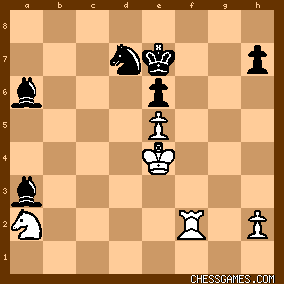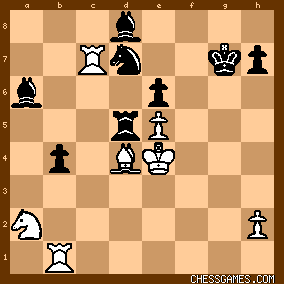| May-24-08 | | Karpova: Is there anything known about his date of birth or at least how old he was when he died? |
|
| Oct-19-13 | | Bob Loblaw: I found this interesting anecdote online.
Emanuel Lasker gained the German master title at Breslau in 1889 when he won the event. Lasker actually won the event by accident. The story goes like this : There where two main contenders for first place, Lasker and von Feyerfeil. Lasker had lost his game against vonFeyerfeil and another game against an outsider, while Feyerfeil had drawn two games and had an adjourned game against Lipke. This adjourned game was an ending R+N+2P [Feyerfeil] versus 2B+N+2P [Lipke], while Feyerfeil most probably would have been able to draw, and then he would have won the tournament half a point ahead of Lasker. But after adjournment he forgot to set up one of his pawns and ended up losing that game after 121 moves! Now he had the same number of points as Lasker and a playoff game had to be played, which was won by Lasker. The mistake was not noticed until a few days later.As a result, Lasker, who was considering giving up chess, won the event and the title of master. Five years later he would be world champion. |
|
| Oct-19-13 | | Bob Loblaw: Here is the infamous missing pawn game
From the NICBase Online:
[Event "Breslau"]
[Site ""]
[Date "1889.??.??"]
[Round "?"]
[White "Von Feyerfeil, Emil"]
[Black "Lipke, Paul"]
[Result "0-1"]
[NIC "FR 16.6.4"]
[ECO "C11"]
[PlyCount "104"]
1. e4 e6 2. d4 d5 3. Nc3 Nf6 4. e5 Nfd7 5. Nce2 c5 6. c3 Nc6 7. f4 Qb6 8.
Nf3 f6 9.
a3 Be7 10. Ng3 O-O 11. Bd3 cxd4 12. cxd4 fxe5 13. fxe5 Rxf3 14. gxf3 Qxd4
15. f4
Nc5 16. Bc2 Bd7 17. Qe2 Na5 18. Rb1 Nab3 19. Be3 Qc4 20. Qxc4 dxc4 21. Rd1
Bc6 22.
Rf1 g6 23. Ke2 Na4 24. Rb1 Nbc5 25. Bd4 Rd8 26. Ke3 Nb6 27. Ne2 Nd5 28. Kd2
b5 29.
b4 cxb3 30. Bxb3 a5 31. Bxd5 Rxd5 32. Ke3 Na4 33. Rfc1 Bd7 34. Rb3 b4 35.
axb4 axb4
36. Rc7 Nc5 37. Rb1 Bf8 38. Ra7 Bb5 39. Nc1 Nd7 40. Ra8 Kg7 41. Rc8 Be7 42.
Na2 g5
43. fxg5 Bxg5 44. Ke4 Ba6 45. Rc7 Bd8 46. Ra7 Rxd4 47. Kxd4 Bb6 48. Ke4
Bxa7 49.
Rxb4 Bc5 50. Rb2 Ba3 51. Rg2 Kf8 52. Rf2 Ke7 0-1 |
|
Oct-19-13
 | | perfidious: At first glance, Feyerfeil has read 'fingerfehler' to this native English speaker and reader. Given what went in the above game, certainly this may be regarded as a propos. |
|
| Dec-15-13 | | Karpova: Reminiscences by Georg Marco: One of the outstanding representatives of the old Viennese school is <k. k. Hofrat d. R.> Emil Ritter v. Feyerfeil. His name appears in the lists of the Viennese Chess Association (<Wiener Schachgesellschaft>) for the first time in February 1865. Two years later, he was elected into the board of directors (<Direktorium>) of that Club. In the 1867 <Monstreturnier> with 45 participants, he came in 2nd with 42.5 points (1st Adolf Csank with 43.0, 3rd Dr. Max Fleißig with 41.5). Ritter von Feyerfeil tried to become Champion of the German Chess Association in the Breslau 1889 Main Tournament *. In his game against Dr. Emanuel Lasker, von Feyerfeil won a pawn in a very good position, but in the afternoon session, he suddenly was worse. Johann Hermann Bauer later found out why - Von Feyerfeil had deployed one pawn less for the resumption of the game. So Dr. Lasker first became Champion, then World Champion. Marco mentions that he congratulates Von Feyerfeil to his 50th anniversary as a master - the article was written around March 1913, so Von Feyerfeil became a master around 1863. Source: Pages 10-11 of the January-February 1915 'Wiener Schachzeitung' * See http://www.edochess.ca/players/p100.... Not to be confused with the Master Tournament: Breslau (1889) |
|
Jan-04-17
 | | GrahamClayton: Why did von Feyerfeil play under the pseudonym of "Mylius" instead of his own name? |
|
| Jan-05-17 | | PhilFeeley: <after adjournment he forgot to set up one of his pawns and ended up losing that game after 121 moves!> If the above is true then how is it that the game posted ended in only 52 moves? |
|
| Jan-05-17 | | PhilFeeley: <Von Feyerfeil had deployed one pawn less for the resumption of the game. > And that was his game against Lasker. So was the 121 move game against Lasker or Lipke? |
|
| Jan-05-17 | | TheFocus: <PhilFeeley> <after adjournment he forgot to set up one of his pawns and ended up losing that game after 121 moves!> If the above is true then how is it that the game posted ended in only 52 moves?> The 52 move game above is when the game was adjourned. See the game in <Der Sechste Kongress des Deutschen Schachbundes. Breslau 1889>, pages 259-263, but only the first 87 moves are given. |
|
| Jan-05-17 | | Paarhufer: <TheFocus: The 52 move game above is when the game was adjourned.> No, that's wrong.
click for larger viewThis is the position after Black's 52th move in the game v. Feyerfeil vs Lipke and here Lipke's notation continued with 53.♖f2-h2. According to the tournament book the game was adjourned after Black's 40th move or a few moves later. The missing pawn on h2 was apparently forgotten after the adjournment. This is the commentator's explanation and there is no confirmation of the players. I think the whole story about the impact of this incident to chess history misses a simple point: White got a lost position by a blunder and not because of a missing pawn on h2. 
click for larger view46.♖a7?? ♖xd4+ 47.♔xd4 ♗b6+. |
|
| Jun-20-17 | | zanzibar: To confirm <Bob Loblaw>'s story: St. Petersburg tb p iii:
<In the July of the same year he competed in the Minor Tournament of the German Chess Association, at Breslau, where he carried off the first prize after tying with Herr V. Feyerfeil, whom he defeated in the tie-match, and this, according to German rule (a most excellent one), entitled him to rank as a master.> https://books.google.com/books?id=3... |
|
| Jun-20-17 | | zanzibar: I think his dob is earlier than circa 1855.
An early mention of him in the literature is in Max Lange's <Sonntags-Blätter> N35 (1861) p_58 (#101) https://books.google.com/books?id=g... Soon thereafter he was sending compositions in.
Mention of him playing a game (and winning?) is in 1864: <Demokrit. Organ für Wissenschaft, Literatur, Kunst, praktische Weltweisheit> p176. Here's the earliest game of his I could find:
<DSZ v19 (1864) G1984 p200> https://books.google.com/books?id=i... I would estimate ~1844 as a better guess of his dob, maybe ~1840. . |
|
| Jun-20-17 | | zanzibar: Can somebody give me a reference for his dod?
I did find mention of him actually still playing in 1917 - BCM v37-38 p385 https://books.google.com/books?id=5... |
|
| Jun-20-17 | | zanzibar: OK, here's maybe a source with him as a student: https://books.google.com/books?id=w... It's 1865/1866, so let's say
dod ~1845.
. |
|
Jul-09-17
 | | offramp: On Facebook, Valery Salov gives his views on the Feyerfeil-Lipke game.
I totally disagree with everything he says. It's load of weirdness. A great mind with TOO much spare time. <This is now oficial story. Kaballah had taken the pawn h2 from the board before the adjourning the game between Feyerfell and Lipke. They did it in order that Feyerfell loses so that Emanuel Lasker could play play off match with him and become the master. Later that Emanuel Lasker became the World Champion beating Wilhelm Steinitz and held the title for 27 years. Kaballah created three world Champions which would have the surname which makes KABALA - LA ( Lasker ), BA ( Botvinnik which is pronounced in russian Batvinjik ) and KA ( Karpov ). Later that KA is followed by Kasparov and Carlsen ( pronounced Karlsen ). Eventually it will be succeded by Karjakin ( also KA ).
The Jewish Kaballah controls the chess. It was not just a luck Lasker had, it was the Jewish conspiracy. Chess is Jewish controlled game 100% so be aware of that.>
Valery Salov |
|






